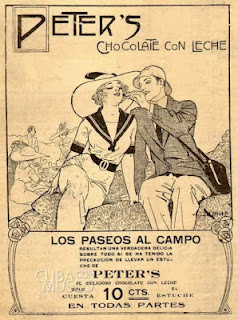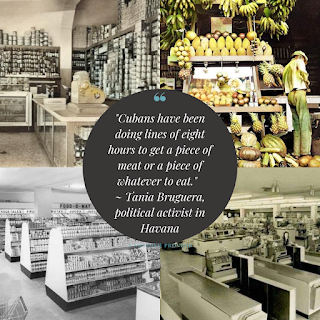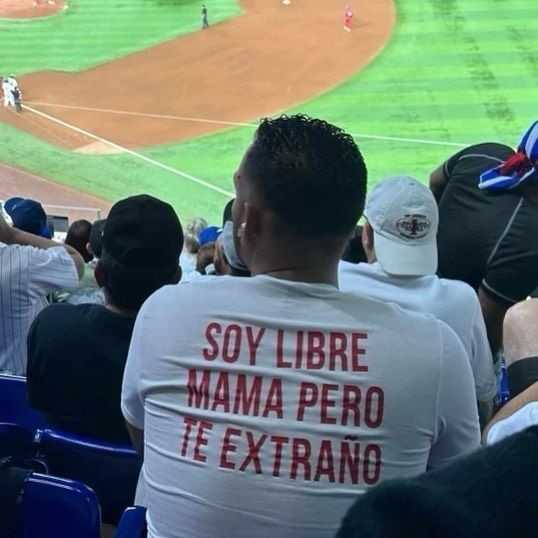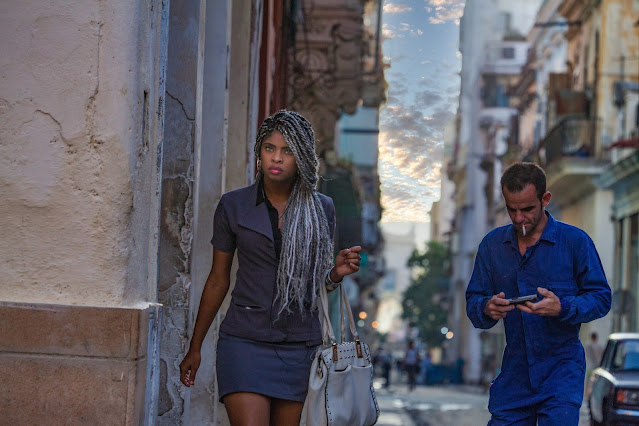Sweet Possibilities in a Cuba Libre
Recently, I met a Cuban woman just over 10 years my junior who arrived in the U.S. from Cuba several years ago. Together we have been compiling a Cuba Story Interview survey to share with the world on the platform cubanswithwings.com (this site). I couldn't believe my ears over her suggested question for No. 9:
9. ¿Si vives en Cuba cuantas veces al año comes chocolate? | If you live in Cuba, how many times a year do you eat chocolate?
What!? I wouldn't even think to propose that question for surely Cuba is both a natural producer of all the ingredients required to make chocolate. I thought some form of chocolate would at least be a ration offering somewhere on the Island or during certain seasons or on special holidays. (Wait - Scratch that idea. Castro banned religion and all the holidays that went along with it and Cuba's yesteryears).
But certainly, there must be chocolate in Cuba; after all, Milton S. Hershey of the Hershey Chocolate Company in Hershey, Pennsylvania once had several chocolate mills in Cuba and even founded and built a town around "his most productive mill" which he named Hershey, Cuba; which Castro later renamed Camilo Cienfuegos. I learned of this very fact on my recent visit to the Cuban Foundation Museum at the Museum of Arts and Sciences in Daytona, Florida. While at the museum, I saw not one but two models of the Hershey Central mill (built in 1919 and completed in 1926) in what was once known as the town Hershey near Santa Cruz, Cuba. This town even included its own Hershey Electric Railroad that still runs to this day. Here are photographs of both those models starting with the smaller "1/16-inch scale model" built by an employee of the mill, Enrique Ortiz Lima, during the mill's construction. These models were placed on exhibit, later sold, and eventually purchased by former Cuban President Fulgencio Batista at an auction. These models along with all the items in the gallery were personal collections within Batista's family home in Daytona and these items were donated to the Cuban Museum in 1974.
I will admit, prior to my visit I had hoped to learn more about Batista's political history at the museum being the grandchild of a former Batista military policeman. Instead, I found nothing on display associated with his former presidency or his politics for that matter. Instead, I found a unique and rare artistic and cultural collection of the history of Cuba's Republic era - one that also included highlights of Cuba's past economic successes.
Of course, I shared my museum photographs with my new amiga and she had no idea of this fact in Cuban History. "Como, la compania Hershey tenia una factoria in Cuba?" El mismo Hershey que ase todos los chocolates que se comen aqui en los estados unidos? No te lo creo!" Every time I see my new friend from Cuba it seems we teach each other something new about our own Cuban history. But what I am most saddened to find by these discussions is how little the younger Cuban generation really knows about their own rather extraordinary Cuban history. They only learn the history of the Revolution and that version which the Cuban govt. wants you to know. "Unless they have known and lived with an elderly parent or grandparent who lived the history, you are not taught it," my new friend confirms.
She also confessed to being a chocolate lover and sadly admitted to only eating chocolate in Cuba twice a year if she was lucky. On those rare occasions, she was only given one bonbon each time unless her parents and grandparents gave her their ration. So it's to no wonder that she binge-ate chocolate upon her arrival to the U.S. for months. It's hard for a recent Cuban arrival to not get emotionally overwhelmed with the many available choices and options of food and everything they encounter outside of Cuba.
In a similar exchange I showed my new friend photographs of Cuban supermarkets from before the Revolution (pre-1959) I had found and pinned on Pinterest like these shown here; again, I left her in total disbelief. Never had she imagined Cuba to once have such nice supermarkets and access to food. She then shared some photographs of today's Cuban markets and this time - I was the one left aghast. It was even worse than I had seen on previous social media posts and in this famous Youtube video "Everything You've Ever Seen About Cuba is a Lie." Here is a quote from one of the documentarists regarding his findings at the local Cuban grocery store and the hour wait at the cash-out line: "There was literally no fresh fruit, no fresh meat, no fresh vegetables, nothing....one brand of the things they do have." It is why every Cuban exile remembers their first visit to the grocery store (or their first visit to the Piccadilly). Yes, this first-time grocery experience is really a Cuban refugee thing; but to clarify, this was not the case for the generation of my grandparents who had to leave their lives as they knew it for a, to some respect, less developed community in a new country.
It has been particularly sad for me in particular to observe, since my birth anyhow, Cuba's continued incremental destruction over time at the hands of Communism. Cuba today is unrecognizable to the Cuban Exiles that escaped Castro's wrath in 1959 through the 1960s. To watch this destruction and not be able to do anything about it caused a broken heart of each Cuban exile since.
So back to chocolate - I can't imagine a life without chocolate, to be honest. It's a personal indulgence I share with both my mother and my daughter. I think they may even love chocolate more than me these days. The taste of chocolate lingers through all my childhood memories; I personally cannot imagine a life without chocolate, as lived by many Cubans today and was lived by my new amiga.
But it doesn't have to be that way, you know. It should never have had to be that way. Buying chocolate in Cuba for Cubans should not be so difficult, expensive, and exclusive. After all, Cuba is home to a variety of Cacao beans and produced and manufactures this world-renown Baracoa chocolate. According to this 2020 article, "The Agroforestry and Coconut Company of Baracoa has exported almost 700 tons of first-class benefited cocoa (type A) and second quality (type B) so far this year, through the state-owned Cubaexport enterprise."
So if the ordinary Cuban cannot readily buy or access Baracoa chocolate and other Cuban-produced chocolate, who is consuming it? Not the Cuban people, unless they cultivate it or sell it for the govt. I suppose or live near the chocolate mill for that matter. You can buy Cuban chocolate in countries like Switzerland, England, Italy, Spain, Venezuela, Mexico, and many countries around the world, whether they're making chocolate from the imported Cuban Cacao or selling the imported Cuban bars made in Cuba. And as always, if you are a tourist visiting Cuba, you can buy Cuban chocolate in Cuba from thegovernment-operated chocolate stores in the city.
But can you imagine all the sweet possibilities in a free Cuba? And the possibility of a free Cuba is no longer just a myth, a surreal idea, an impossible dream, or an unfulfilled wish. This week, on November 15, 2021, the Cuban people plan to peacefully protest for freedom. Upwards of 100 protests have been scheduled around the world to show solidarity and support for the Cubans on the island risking their lives to peacefully protest on this day.
How sweet would it be to bring the chocolate culture back to the Cuban culture that reinvented it centuries ago? Wouldn't it be nice to make chocolate so readily available and affordable in Cuba that no Cuban chocolate lover ever lives without the taste of this simple pleasure? Chocolate like freedom should never be a privilege. In a free Cuba, Cuba's chocolate history and legacy can be celebrated. We can even bring back the Cuban bakery. I'll bet it's difficult for the Americans familiar with Miami's rich Cuban-American culture to understand that the Cuban bakeries and cafeterias they find on every block just do not exist in Cuba - but they once did. Oh, I revel at the thought of a free Cuba and all the Sweet Possibilities that will come with freedom.















Comments
Post a Comment
Please feel free to share your #soscuba story here. If you would like to be featured on this page, please Submit Your Story online at cubanswithwings.com